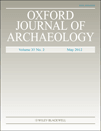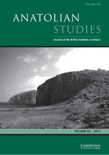
Archaeological Reports-London
Scope & Guideline
Delving Deep into the Richness of Human History
Introduction
Aims and Scopes
- Roman and Byzantine Archaeology:
The journal emphasizes research on Roman and Byzantine periods, exploring various aspects such as urban development, art, and societal changes in regions like Crete and the Peloponnese. - Greek Art and Architecture:
A significant focus is placed on the study of Greek art and architecture, showcasing recent developments and trends that reflect the evolution of artistic practices and construction techniques. - Environmental and Societal Interactions:
Research examining the interactions between ancient societies and their environments, including climate impacts and adaptation strategies, is a core area of interest. - Material Culture and Technological Advances:
The journal highlights studies related to material culture, including archaeometallurgy and zooarchaeology, which provide insights into ancient production and subsistence practices. - Fieldwork and Research Reviews:
Regular reviews of archaeological fieldwork and research initiatives, especially those conducted by institutions like the British School at Athens, contribute to the journal's commitment to documenting ongoing academic efforts.
Trending and Emerging
- Climate and Environmental Studies:
Recent publications increasingly focus on the intersection of climate, environment, and society, highlighting the importance of understanding how ancient populations adapted to changing environmental conditions. - Shipwreck and Maritime Archaeology:
There is a growing trend towards the study of shipwrecks and maritime archaeology, emphasizing the significance of maritime trade and naval activities in ancient Mediterranean societies. - Zooarchaeological Research:
The rise of zooarchaeological studies indicates a burgeoning interest in understanding ancient diets and animal husbandry practices, contributing to broader discussions on subsistence and economy. - Interdisciplinary Approaches:
An emerging theme involves interdisciplinary methodologies, incorporating techniques from fields such as archaeometry and environmental science to enrich archaeological interpretations.
Declining or Waning
- Palaeolithic Archaeology:
Research on Palaeolithic archaeology has seen a noticeable decline, with fewer recent studies addressing this period, indicating a potential shift in focus towards later historical periods. - Textile Economies:
The exploration of textile economies in ancient Greece is less frequently addressed in recent publications, suggesting a waning interest in this niche area of research compared to broader archaeological themes. - Sanctuaries and Cult Practices:
Although once a prominent theme, recent works on sanctuaries and cult practices from the Roman conquest to Late Antiquity have diminished, possibly overshadowed by more contemporary archaeological issues.
Similar Journals

Oxford Journal of Archaeology
Connecting Scholars, Inspiring DiscoveriesOxford Journal of Archaeology is a prestigious peer-reviewed journal published by WILEY, dedicated to advancing the field of archaeology through innovative research and insightful discourse. Established in 1982, this journal has become a vital resource, showcasing high-impact studies that resonate within the arts and humanities, as well as interdisciplinary fields such as geography and planning. With an impressive Q1 ranking in both Archaeology and Arts & Humanities categories, and a Q2 ranking in Geography, Planning, and Development, the journal consistently maintains its reputation for excellence—evidenced by its ranking in the 81st percentile within the Scopus Arts and Humanities Archaeology category. The Oxford Journal of Archaeology not only provides scholars, professionals, and students with access to cutting-edge archaeological research but also encourages collaboration and dialogue among a diverse academic community. Although the journal does not currently offer Open Access, it remains a crucial platform for those seeking to expand their knowledge and impact in this dynamic field.

Anatolian Studies
Illuminating the Richness of Anatolian HistoryAnatolian Studies, published by Cambridge University Press, stands as a premier forum for research in the fields of archaeology, cultural studies, and history. Established in 1951, this esteemed journal has consistently contributed to the academic discourse surrounding the rich and multifaceted history of Anatolia, earning its place in the Q1 category across multiple disciplines. With a notable impact factor reflected in its Scopus rankings, it ranks among the top journals in its fields: 78th in History, 155th in Cultural Studies, and 55th in Archaeology, showcasing its significant influence and recognition. This journal serves as an invaluable resource for researchers and scholars seeking to delve into the intricacies of Anatolian heritage, providing a platform for innovative research and critical discussion within the academic community. While it currently does not offer open access, Anatolian Studies continues to enrich scholarly resources and advance knowledge within its key areas of focus.

Deltion of the Christian Archaeological Society
Fostering Dialogue on the Rich Tapestry of Christian HeritageDeltion of the Christian Archaeological Society (ISSN: 1105-5758, E-ISSN: 2241-2190), published by the Christian Archaeological Society in Athens, Greece, stands as a pivotal source of scholarly work within the realm of Christian archaeology. This journal is dedicated to disseminating high-quality research that promotes the understanding of Christian history, heritage, and archaeological practices. Though it operates under traditional access options, it provides a comprehensive platform for researchers and professionals alike, fostering dialogue and collaboration within the archaeological community. With a commitment to advancing knowledge, the Deltion aims to support both established scholars and emerging voices, reinforcing the significance of archaeology in interpreting religious narratives and cultural contexts. Researchers, students, and professionals interested in the intersections of archaeology, history, and theology will find this journal an invaluable resource in their scholarly pursuits.

Intersecciones en Antropologia
Stimulating critical discussions in anthropology.Intersecciones en Antropologia, published by the Universidad Nacional del Centro de la Provincia de Buenos Aires (UNICEN), Facultad de Ciencias Sociales, is a premier open-access journal in the field of anthropology, having established its presence since 2010. With an impressive impact factor and currently holding the distinguished Q1 quartile ranking in anthropology for 2023, this journal has quickly become a vital resource for scholars and practitioners alike, offering a platform for innovative research and critical discussion. The journal aims to advance anthropological scholarship by encouraging the dissemination of diverse perspectives and stimulating dialogue across geographical and cultural boundaries. Its open-access model, adopted in 2017, ensures that valuable research findings are accessible to a global audience, fostering collaboration and engagement within the academic community and beyond. Located in the vibrant cultural context of Argentina, Intersecciones en Antropologia serves as a conduit for significant anthropological dialogues, making it an essential read for those dedicated to understanding and contributing to the evolving landscape of social sciences.

Adalya
Cultivating a Deeper Understanding of Historical ContextsAdalya, published by the esteemed Koc University Suna & Inan Kirac Research Center for Mediterranean Civilizations (AKMED), is a prominent academic journal dedicated to the fields of Archeology, History, and Conservation. With an ISSN of 1301-2746, this journal serves as an essential platform for scholars and researchers, fostering insightful discussions and disseminating significant findings about Mediterranean civilizations. Recognized in the quartile rankings of Q3 in Archeology and Q2 in both Conservation and History for the year 2023, Adalya reflects an impactful presence in its respective disciplines. Although it operates under a traditional subscription model, the journal remains accessible to a diverse audience interested in the nuanced exploration of historical contexts and conservation practices. Located in Antalya, Turkey, the journal has carved out a niche since its inception in 2009, bridging the past and present through rigorous academic inquiry. Whether you are a seasoned researcher or a student eager to deepen your understanding of Mediterranean cultures, Adalya offers invaluable resources and perspectives that enrich the academic community.

Zbornik Radova Vizantoloskog Instituta
Connecting Scholars Through the Lens of Byzantine StudiesZbornik Radova Vizantoloskog Instituta is a distinguished open-access journal published by the Institute of Byzantine Studies, Serbian Academy of Sciences and Arts, located in Belgrade, Serbia. Since its inception in 2003, this journal has served as a vital platform for the dissemination of scholarly research in the fields of Classics, History, Linguistics and Language, and Literature and Literary Theory. Although it currently holds a Q4 ranking in the 2023 category quartiles, its commitment to fostering academic discourse and research accessibility is unwavering. The journal features a diverse range of articles that explore the complexities and nuances of Byzantine studies and related disciplines, catering to a broad audience of researchers, professionals, and students dedicated to the humanities. With a focus on both historical context and contemporary perspectives, Zbornik Radova Vizantoloskog Instituta aims to contribute significant insights into the academic community while promoting scholarly interaction on a global scale.

Stratum Plus
Navigating the Rich Tapestry of Human ExperienceStratum Plus, published by HIGH ANTHROPOLOGICAL SCH UNIV, is a distinguished academic journal based in Moldova that focuses on the fields of Anthropology, Archeology, and History. With an impressive impact factor reflecting its stature—ranked in the Q2 category for both Anthropology and Archeology, and Q1 for Archeology in the arts and humanities—this journal is a vital resource for scholars, professionals, and students alike. The journal's comprehensive scope encompasses a wide array of interdisciplinary studies, making it a beacon for innovative research and critical discourse within these disciplines. Since its inception in 2014, Stratum Plus has strived to foster academic excellence and knowledge dissemination, thus playing a crucial role in shaping contemporary anthropological and archaeological thought. While currently not available as Open Access, the journal maintains a strong online presence, with access options available through institutional subscriptions. Located at ZIMBRULUI 10A ST, KISHINEV MD-2024, MOLDOVA, Stratum Plus invites contributors and readers to engage with cutting-edge research that continues to enrich the global academic community.

ARCHAEOLOGY IN OCEANIA
Exploring the Depths of Pacific HeritageARCHAEOLOGY IN OCEANIA, published by Wiley, is a leading journal that delves into the rich and diverse archaeological landscape of the Pacific region. With a commitment to advancing knowledge in anthropology and archaeology, this esteemed publication has been pivotal in shaping scholarly discussions since its inception in 1966. Spanning generations of research, it has seen converged years of publication from 1966 to 1980 and from 2002 to 2024. With an impressive Scopus ranking placing it in the top quartiles across multiple categories - including Q2 in Anthropology and Q1 in Archeology (arts and humanities) - the journal distinguishes itself as a must-read for researchers, professionals, and students alike. Although it operates on a subscription model, its rigorous peer-reviewed articles and comprehensive studies contribute significantly to understanding the past of Oceania, making it an essential resource for those invested in this vibrant field of study.

Lucentum
Fostering Knowledge Across DisciplinesLucentum is a distinguished open-access journal published by Universidad de Alicante, focusing on the interdisciplinary fields of Archeology, History, and Paleontology. Since its inception in 1982, it has established itself as a vital platform for scholars and researchers to disseminate their findings, contributing significantly to the academic landscape in Spain and beyond. The journal's notable rankings, including Q1 status in History and Q2 in Archeology, reflect its commitment to high-quality scholarship and rigorous peer review. With an impressive impact factor and recognition in Scopus, Lucentum serves as an essential resource for professionals, students, and historians, fostering a deeper understanding of cultural and historical contexts through a wealth of interdisciplinary research. The journal continues to embrace open access, ensuring that critical knowledge is freely available to the global research community.

Archaeological and Anthropological Sciences
Exploring Humanity Through Science and HistoryArchaeological and Anthropological Sciences is an esteemed peer-reviewed journal published by Springer Heidelberg, specializing in the interdisciplinary fields of archaeology and anthropology. Since its inception in 2009, this journal has established itself as a pivotal resource for researchers and professionals, featuring cutting-edge studies that bridge the gap between the sciences and humanities. With its impressive 2023 Q1 rankings in Anthropology and Archaeology categories, the journal stands out in the Scopus landscape, ranking within the top 5% of its field—Rank #18/413 in Archaeology (Arts and Humanities) and Rank #28/502 in Anthropology. This is complemented by its commitment to disseminating high-quality research to a global audience, despite being a non-Open Access publication. The journal's scope encompasses innovative methodologies, archaeological findings, and anthropological insights that are vital for advancing knowledge and fostering academic discourse. As it moves toward its upcoming converged years, Archaeological and Anthropological Sciences continues to solidify its reputation as a key forum for scholarly exchange in these fields.